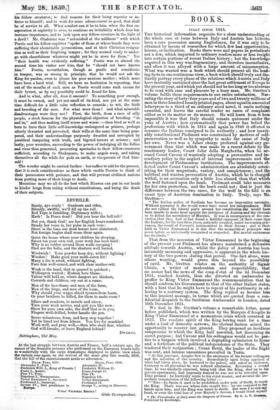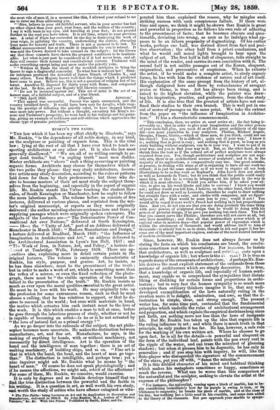BOOKS.
ITALY SINCE 1815.
THE historical information requisite for a clear understanding of the whole case at issue between Italy and Austria has hitherto been a rare possession among Englishmen, for it was only to be obtained by means of researches for which few had opportunities, leisure, or inclination. Books there were and papers in periodicals not a few, which imparted to ordinary readers more or less insight into certain portions of recent Italian history ; but the knowledge acquired in this way was fragmentary, and therefore inconclusive, and, often it was alloyed with a large amount of misconception. What was wanted was a book which should present all the lead- ing facts in one continuous view, a book which should truly and die- tinctly portray every phase of the relations which Austria and Italy have mutually sustained since the last great settlement of Europe to the present year, and which yet should not be too longer too abstruse to-be read with ease and pleasure by a busy man. Mr. Gnetton's volume fulfils these requirements to our entire satisfaction.Nar- rating the story of forty-four years and of two and twenty millions of men in three hundred loosely printed pages, about equal in amount of letterpress to a third of an ordinary sized novel, it omits nothing essential, and leaves the careful reader no cause of complaint either as to its matter or its manner. He will learn from it how impossible it was that Italy should remain quiescent under the yoke of Austria ; how systematically that power has belied the professions with which in 1815 and again in 1848 it affected to reassure the Italians consigned to its authority ; and how inevit- ably constitutional Piedmont was constrained by motives of self- preservation as well as by sympathy to make the cause of Italy her own. Never was a falser charge preferred against any go- vernment than that which was made in a recent debate by the reactionary leader, Count Jolar della Mazyrcherita, when he ac- cused Count Cavour of wantonly adopting a provocative and in- cendiary policy to the neglect of internal improvements and the development of Piedmontese institutions. The improvements ef- fected under Count Cavour's administration are absolutely aston- ishing for their magnitude, variety' and oempleteness ; and the habitual and wanton provocation of Austria, which he is charged withal, is an accusation only a little less absurd than that which the wolf fastened urn the lamb. Piedmont could. take measures for her Men protection, and the lamb could not; that is just the difference between the two eases, for the wolf in the fold is an exact type of Austrian domination in Italy. Truly, says Mr. Gretton- " The Italian policy of Sardinia has become an imperative necessity. Without pursuing it she would never have saved her independence. Had she not rallied the liberal party around her constitution she would have been unable to make head against the intrigues of Austria and the clericals or to defeat the ascendancy of Hazzini. It was in consequence of the con- viction that they had at last found a faithful exponent of their cause that the Italians, for the last three years, patiently awaited, under increasing grie- vances, the result of flavour's interposition in their favour; and to their faith in Victor Emmanuel is it due that the monarchical principle was never before so universally recognized or respected. But mortal enduranoe has its limits."
That from the accession of Victor Emmanuel to the beginning of the present year Piedmont has always maintained a defensive attitude towards Austria, whilst the policy of Austria has been invariably menacing and. aggressive, is apparent in the whole his- tory of the two powers during that period. One fact alone, were others wanting, would prove this beyond the possibility of cavil. Mr. Gretton relates on the authority of Signor Chide, a writer of moderation and respectability, that no sooner had the news of the coup d'etat of the 2d December 1851, reached. Austria, than she directed an ambassador to proffer to King Victor Emmanuel the recommendation that he should conform his Government to that of the other Italian states, with a hint that he might have to repent of his pertinacity in ad- hering to a contrary system. The King replied as became him to this insolent message, in terms which are quoted from a con- fidential despatch to the Sardinian Ambassador in London, dated 10th December 1851.
We find in Mr. Grettou's volume a remarkable letter, never before published, which was written by the Marquis d'Azeglio to King Victor Emmanuel at a momentous crisis which occurred in 1853. The resolute spirit of the King having sunk for a tune under a load of domestic sorrows, the clerical faction seized the opportunity to recover lost ground. They proposed an insidious compromise to which the King half assented, not discerning ita secret purpose ; but Cavour and his colleagues would not be par- ties to a bargain which involved a degrading submission to Rome and a forfeiture of the political independence of the State. They tendered their resignation ; Count Revil, the leader of the Right was sent, and intense uneasiness prevailed in Turin. "At this juncture, Azeglio flew to the assistance of his former colleagues and the salvation of the country.. Immediately upon being apprised of what had taken place, he hastened to the palace, and asked an audience. Contrary to all precedent he was refused admission. Returning a second time, he was similarly repulsed, being told that the King, shut up in his private apartments, had expressly desired he was not to be intruded upon. Time pressed : he hurriedly wrote to his royal master, and secured the lie- mediate transmission of the following letter :— "'Sire—In Spain it used to be prohibited, under pain of death, to touch the King. There was one whose robe caught fire ; no one ventured to 121 hands upon him, and the King was burnt to death. Bat were I.tokruk head, or even the total loss of your Majesty's favour, I would thin my
• The Ficiaritudes of Italy since the (lovresa of Vienna. By A. L, V. OMNI. Published by Boutledge.
the most vile of men if, in a moment like this, I allowed your refusal to see me to deter me from addressing you.
"'Sire, believe in your old faithful servant, who in your service has had no other object than your good, your fame, and the welfare of the country ; I say it with tears in my eyes, and kneeling at your feet; do not proceed further in the road you have taken. It is yet time, return to your previous one. A cabal of friars has succeeded in one day in destroying the work of your reign, in agitating the country, undermining the statute, obscuring your name for honesty and truth. There is not a moment to be lost. No official announcement has as yet made it impossible for you to retract. It was said the Crown desired to take counsel on the subject ; let the Crown say that these counsels have shown the proposed conditions to be inadmis- sible. Let what is just past be considered as if it had never been, and af- fairs will resume their normal and constitutional current. Piedmont will suffer everything except being put anew under the priestly yoke. "'Witness in Spain the result of the monkish intrigues to bring the Queen to sign a disgraceful concordat. To what has it reduced her! Simi- les intrigues produced the downfall of James Stuart, of Charles X., and many others. Your Majesty knows well that the things which I predicted have come to pass. Believe me, this is not a question of religion but of in- terest. Amadeus II. disputed for thirty years with Rome, and conquered at the last. Be firm, and your Majesty will likewise conquer.
"'Do not be incensed against me. This act of mine is the act of an honest man, of a faithful subject, and of a true friend. " ' 29th April 1855. (Signed) "This appeal was successful. Cavour was again summoned, and the country breathed freely. It would have been easy for Azeglio, while reap- ing the prestige of defeating the priestly cabal, to have stepped himself once more into power. But without a thought, excepting his King's ho- nour and Piedmont's prosperity, he went back to his writings and his paint- ing, giving an example of nobleness and self-oblivion which approaches the classic type of genuine patriotism."



























 Previous page
Previous page